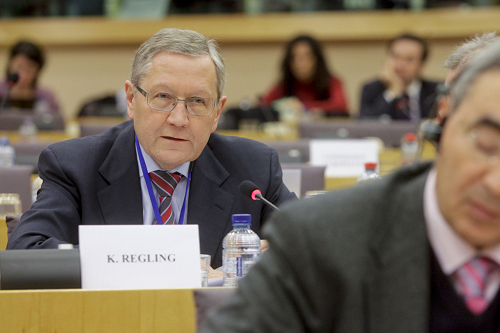ESM Managing Director on Greece: "There is no need for a nominal haircut"
The European Stability Mechanism (ESM) helps troubled euro zone countries get their finances in order using loans and other forms of assistance. On 10 November Managing Director Klaus Regling comes to the Parliament to discuss the new financial assistance programme for Greece with the economic committee and Jeroen Dijsselbloem, president of the Europgroup.

Klaus Regling
Greek Prime Minister Alexis Tsipras asked for the Parliament to be involved in the supervision of the programme. Will this help to increase its legitimacy?
The key issue here is democratic accountability. In this respect the ESM already ensures full democratic accountability of its operations, such as granting financial support or monitoring policy conditionality. This is done according to different national constitutional traditions, through the extensive involvement of national parliaments of some member states.
Also the European Parliament needs to be well informed and I am very happy to engage in a constructive dialogue with the Parliament. This is demonstrated by my joint appearance with Eurogroup president Jeroen Dijsselbloem at the economic committee meeting on 10 November.
However at this stage, the ESM is an intergovernmental organisation and not an EU institution. As a result there is no formal role foreseen for the European Parliament in the negotiations for stability support. A formal role for the Parliament would require a fundamental change of the ESM's decision making process. This would happen if EU member states decided to integrate the ESM into the EU treaty framework.
Do you see any chance of a haircut or debt relief along the lines of the proposals made by the International Monetary Fund (IMF)? Is Greece's debt burden, including the new debt to be incurred, sustainable?
A nominal haircut is certainly not on the cards and the IMF is not proposing it either. In my view, there is also no need for such measures. Let me explain why. Greece today already has benefitted significantly from loans from the ESM and the European Financial Stability Facility (EFSF). We disbursed about €143 billion, which corresponds to 45% of all Greek debt. We did that on very favourable terms. These loans have an average maturity of 32 years and a very low interest rate of currently about 1% because we charge only our own low funding cost.
These generous lending terms save the Greek budget huge amounts of money every year. These gains - in what economists call net present value terms - are so substantial that they are very similar to a haircut from a Greek perspective. If you add up all favourable terms made in the European official lending, the benefit is equivalent to a 50% haircut from a Greek perspective. But this is very different from a nominal haircut. Crucially, our approach neither leads to any loss for creditors nor to any direct transfer from creditors to Greece.
The ESM could improve these financing conditions further provided Greece fully sticks to its reform commitments. For example, we could extend maturities or prolong the interest rate deferral. Member states will look at the reform implementation in Greece and decide whether to engage into discussions on further debt relief. We need to bear in mind that already today Greece’s debt service in terms of gross domestic product is below that of other European countries and there are almost no payments to us until 2023.
Source: European Parliament
- 299 reads
Human Rights
Ringing FOWPAL’s Peace Bell for the World:Nobel Peace Prize Laureates’ Visions and Actions

Protecting the World’s Cultural Diversity for a Sustainable Future

The Peace Bell Resonates at the 27th Eurasian Economic Summit

Declaration of World Day of the Power of Hope Endorsed by People in 158 Nations

Puppet Show I International Friendship Day 2020

